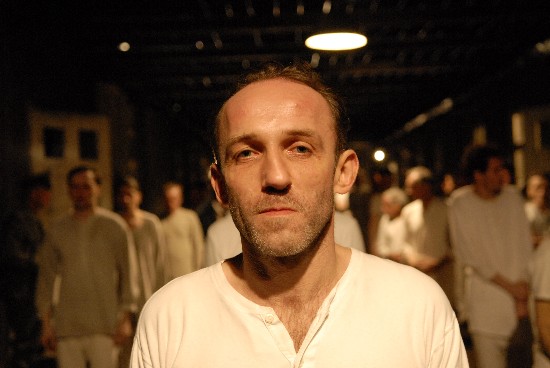

Reviews of Recent Independent, Foreign, & Documentary Films in Theaters and DVD/Home Video
Written & Directed by Stefan Ruzowitzky Produced by Josef Aichholzer, Nina Bohlmann & Babette Schröder Director of Photography, Benedict Neuenfels Edited by Britta Nahler Music by Marius Ruhland Released by Sony Pictures Classics Language: German with English subtitles Germany/Austria. 98 min. Rated R With Karl Markovics, August Diehl, Devid Striesow & Dolores Chaplin Special Features: Commentary with director Stefan Ruzowitzky. Deleted scenes. Making-of The Counterfeiters. Adolf Burger's historical artifacts. Q & A with Ruzowitzky. Interviews with Adolf Burger, actor Karl Markovics & Ruzowitzky. English, French & Spanish subtitles. German & French audio. Trailer.
The film opens with a gaunt and tight-lipped Scully (Karl Markovics), wearing an ill-fitting suit with seams showing, approaching the front desk of a
marbled Monte Carlo hotel lobby. He has no problem getting a room; inside his one piece of luggage, a leather brief case, is loads of loot, and in
1945, money not only talks but sets the terms.
Flashback to Germany 1936: he holds court in a smoky nightclub. One of his lackeys describes him, with no small amount of admiration, as “the most
charming scoundrel in Berlin.” Booze, fake passports, he provides it all. And the customer always comes first: when one blond fräulein shoots him a
withering look upon finding out his real name, he doesn’t bat an eye. His motto: one adapts or dies, which he lives out to the fullest after the
police bust his counterfeit money and passport ring.
The year 1939 finds him with a sledgehammer in the rock quarry at Mauthausen concentration camp. Briefly, the film’s cinematography turns an icy
gray, the recent palette of choice for Holocaust films. And it’s only here that writer/director Stefan Ruzowitzky shortchanges Sally’s survival
skills. This work detail was virtually a death sentence; to survive at all was an achievement.
Hard-edged and less spectral colors return, just when Sally’s moral ground turns grey; he’s transferred to Sachsenhausen in 1944, becoming part of an
effort to create counterfeit sterling in Hitler’s bizarre scheme to flood and destroy the British economy and possibly finance Germany’s war machine.
His draftsmen skills have kept him alive so far, put to use by the SS. Now, he’s given new clothes, secondhand actually – the previous owner has been
deported to Auschwitz – and assigned to a group of craftsmen, all Jewish, including communist Adolf Burger (August Diehl). The real-life Burger,
now in his nineties, wrote the memoir that is the basis for the film.
All the men live in spotless barracks removed from the rest of the inmates. In the workshop, a yearning Bel Canto aria plays in the background as
Sally retouches the counterfeit pound notes and supervises the other men. By aiding the Nazi war machine and prolonging the Nazi regime, they’re kept alive. If they fail, they die,
and they know it.
Ruzowitzky doesn’t waste any time in his lean and solid script, and intelligently sets most of the film within the confines of the barracks, making
the film more a psychological prison drama in line with Midnight Express, but the Holocaust is front and center in the viewer’s mind, as well
as the film’s. From one window, the counterfeiters can see off-screen the shoe-testing squad: weighed-down inmates forced to run around a rocky
track, testing out the resoled shoes of those sent to the death camps, another work detail-turn-death sentence. Besides random shootings and the
rat-a-tat of gunfire in the background, the
atrocities at the camp occurring beyond the workshop walls are left unseen and thus made more vivid for the viewer.
DVD Extras: Jump to the interview with real counterfeiter Adolf Burger. The
90-year-old has more vigor than the reserved actor Markovics or director Ruzowitzky in their interviews. In another extra, he brings out documentation
he began collecting to refute Holocaust deniers, years before he wrote his memoir. (With the S.S. still about, he even took photos immediately after being liberated from
a concentration camp in Austria, entering into a nearby home and demanding a camera and film from the woman of the
house.)
But in the director’s detailed commentary, Ruzowitzky lets the viewer in on which scenes were fact-based and which were fiction, as well as perhaps
the key ingredient to his absorbing film: practice, practice, practice. Well, a month of rehearsals, actually, where the actors found their
characters, and he, with a lot of input from his cast, rewrote the script.
Before shooting, he gave Burger the screenplay, and Burger approved the departures from real life, knowing that the project would be a feature film,
not a documentary. Crucially, though, he insisted on one change, that at the climax the inmates not behave like their Nazi captors and seek revenge.
(When Ruzowitzky won the Best Foreign Language Film Oscar earlier this year, Burger, who had also been imprisoned at Auschwitz, was with him at the
Kodak Theatre.) Kent Turner
|